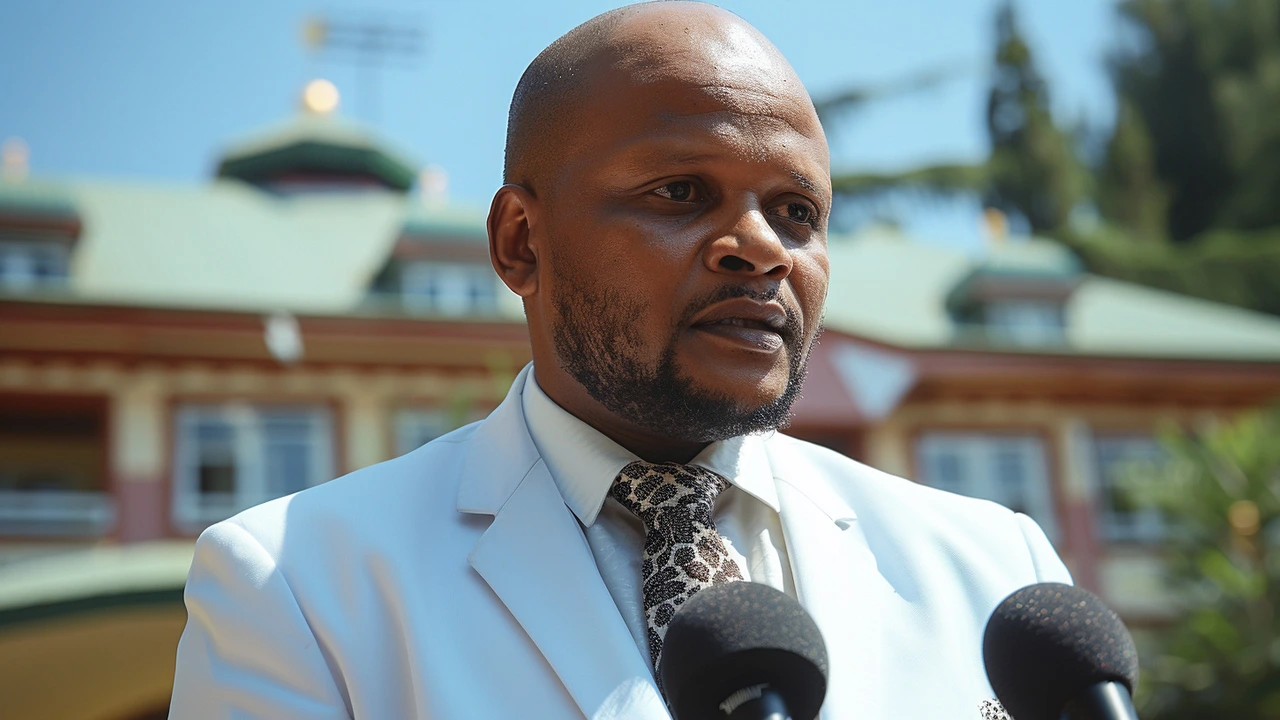Jalango Questions SRC's Salary Proposal
In a bold move that has sparked widespread debate, popular radio personality Jalango has openly rejected a proposed salary increase put forth by the Salaries and Remuneration Commission (SRC). Jalango, known for his candid and outspoken nature, has not minced words in expressing his skepticism about the motivations behind the proposal. According to the prominent media figure, the salary increment is a cleverly disguised set-up aimed at achieving objectives that may not be in the best interest of the public or the intended beneficiaries.
Jalango articulated his apprehensions, raising pointed questions about the authenticity and timing of the proposed pay hikes for certain public servants. “Why now?” he pondered aloud during a recent episode of his popular radio show. He argued that the sudden move by the SRC to significantly increase salaries seems too calculated and political, rather than a genuine attempt to address wage disparities or reward public servants for their hard work.
Suspicions of Manipulation
The radio host did not stop at merely rejecting the increment; he delved into the deeper implications of such a move. Jalango suggested that the SRC’s decision might be an attempt to curry favor with certain groups and manipulate public perception. By positioning itself as a benevolent body willing to improve the financial status of public servants, the SRC could be trying to deflect criticism and foster a more positive image among citizens. He warned that such tactics might be used to obscure the commission’s true intentions and to sway public opinion in a favorable direction, particularly in politically charged times.
Jalango’s concerns resonate with a broader sentiment among some sections of the public, who view with suspicion any significant financial decisions made by governing bodies in the absence of transparency and accountability. The timing and the manner in which the proposal was unveiled have only served to heighten these suspicions, leading many to question the underlying reasons for the proposed increments.

Details of the SRC Proposal
The SRC’s proposal includes substantial salary increases for specific categories of public servants, a move that, on the surface, appears to be an effort to rectify financial disparities and improve the livelihoods of those who serve the public. The commission has justified this proposal by citing the need to attract and retain talent in the public sector, arguing that competitive salaries are essential for maintaining a motivated and efficient workforce. The increments vary by category, with the most significant hikes aimed at positions that traditionally attract top-tier professionals.
However, the specifics of how these increments will be funded and the broader economic implications have not been thoroughly addressed, something Jalango was quick to highlight. He emphasized the importance of fiscal responsibility, especially given the current economic climate, and called for a more measured approach to public sector wage management.
The Public’s Response
Jalango’s rejection of the SRC’s proposal has prompted a diverse array of reactions from the public. Supporters of Jalango have praised his courage in speaking out against what they perceive as a potentially exploitative tactic. They commend him for prioritizing integrity and transparency over personal financial gain.
Conversely, critics argue that Jalango’s stance might undermine genuine efforts to improve the conditions of public servants. They contend that if the proposal is indeed intended to address existing salary disparities, dismissing it outright could be detrimental to those who stand to benefit from the increments. Some suggest that instead of a blanket rejection, a critical and constructive dialogue about the proposal’s merits and shortcomings would be a more productive approach.

Looking Ahead
As the debate continues, the spotlight is firmly on the SRC and its next steps. The commission will need to address the concerns raised not only by figures like Jalango but also by the wider public. Transparency, clarity, and accountability will be crucial in moving forward and ensuring that any decisions made are truly in the best interest of the public servants and the citizens they serve.
For now, Jalango’s stance serves as a potent reminder of the importance of scrutinizing policies and proposals that have far-reaching implications. It underscores the need for vigilance and skepticism in governance, particularly when financial decisions are at stake. The unfolding discourse around the SRC’s proposal is sure to remain a topic of keen interest and fervent discussion in the weeks and months to come.

hg gay
July 3, 2024 AT 21:39I totally get why Jalango sounded the alarm about the SRC’s sudden salary surge. The timing feels more like a political chess move than a genuine effort to reward public servants. When a commission rolls out a hefty pay raise without a clear funding roadmap, it raises eyebrows across the board. Many citizens are already feeling the pinch from the current economic climate, so a surprise payout can look like a distraction. Transparency should be the cornerstone of any fiscal policy, especially when taxpayers’ money is at stake. The SRC claims it wants to attract talent, but the lack of detail on how it will sustain these salaries is worrisome. It’s also telling that the proposal targets specific categories while leaving others in the dark. Such selective upgrades can fuel perceptions of favoritism and might even be a way to court certain interest groups. In a democracy, public bodies need to earn trust by being open, not by pulling hidden levers behind the scenes. Jalango’s platform gave everyday listeners a space to voice these concerns, and that’s commendable. A healthy debate can push the SRC to clarify its motives and present a more balanced plan. If the commission truly cares about long‑term fiscal health, it should open its books for public scrutiny. Moreover, aligning salary structures with inflation and cost‑of‑living metrics can help avoid future resentment. Bold moves like this deserve a thorough cost‑benefit analysis before being rolled out. I hope the dialogue doesn’t die out and that policymakers listen to the chorus of skeptics. 🙏💬🌍
Owen Covach
July 5, 2024 AT 07:11Sharp take Jalango, love it.
Pauline HERT
July 6, 2024 AT 16:43From a patriotic standpoint, any attempt to manipulate public opinion for bureaucratic gain is unacceptable. The SRC should be held accountable to the people it serves, not to shadowy agendas. Blindly accepting salary hikes without scrutiny undermines national integrity. Transparency is a hallmark of a strong nation, and this proposal falls short of that ideal. Let the citizens demand honest accounting before any dollars change hands.
Ron Rementilla
July 8, 2024 AT 02:15While the call for accountability is spot on, it's also vital to consider the real needs of frontline workers who often struggle with stagnant wages. Ignoring their plight in favor of political rhetoric does them a disservice. A balanced review that weighs both fiscal prudence and employee welfare would serve the nation better. The SRC could benefit from an independent audit to clear the fog. Constructive criticism, not just anger, will pave the way forward.
Chand Shahzad
July 9, 2024 AT 11:47It is essential that any remuneration revision be grounded in robust data and clear objectives. Stakeholders should be invited to a transparent forum where concerns are addressed openly. By fostering collaboration between the SRC and civil servants, a mutually beneficial solution can emerge. Let us champion a process that uplifts both the public sector and the taxpayers.
Eduardo Torres
July 10, 2024 AT 21:19I appreciate the call for a forum, yet we must ensure it does not become a stage for performative dialogue. Real outcomes depend on actionable steps, not just promises of collaboration. A concrete timeline and measurable targets would lend credibility to the process.
Emanuel Hantig
July 12, 2024 AT 06:51The interplay between power and responsibility has been a timeless theme in political philosophy. When institutions like the SRC wield fiscal authority, they inherit a moral obligation to justify every decision. Public trust is not given-it is earned through consistent transparency and ethical stewardship. If the commission seeks to legitimize its actions, it must subject its proposals to rigorous public scrutiny. Only then can the social contract be reinforced rather than eroded. 🤔✨
Byron Marcos Gonzalez
July 13, 2024 AT 16:22Ah, the melodrama of policy! The SRC's script misses the crucial act of honesty. 🎭
Chris Snyder
July 15, 2024 AT 01:54According to the latest fiscal report, the government’s deficit has risen by 3.2% year‑over‑year, narrowing the margin for large salary expansions. A phased increase tied to specific performance metrics could mitigate fiscal strain while still rewarding excellence. Consider a tiered rollout that aligns with budgetary cycles to preserve stability. 😊
Hugh Fitzpatrick
July 16, 2024 AT 11:26Oh great, because nothing says “stability” like dangling bonuses on performance reviews that are about as objective as a weather forecast. 🙄